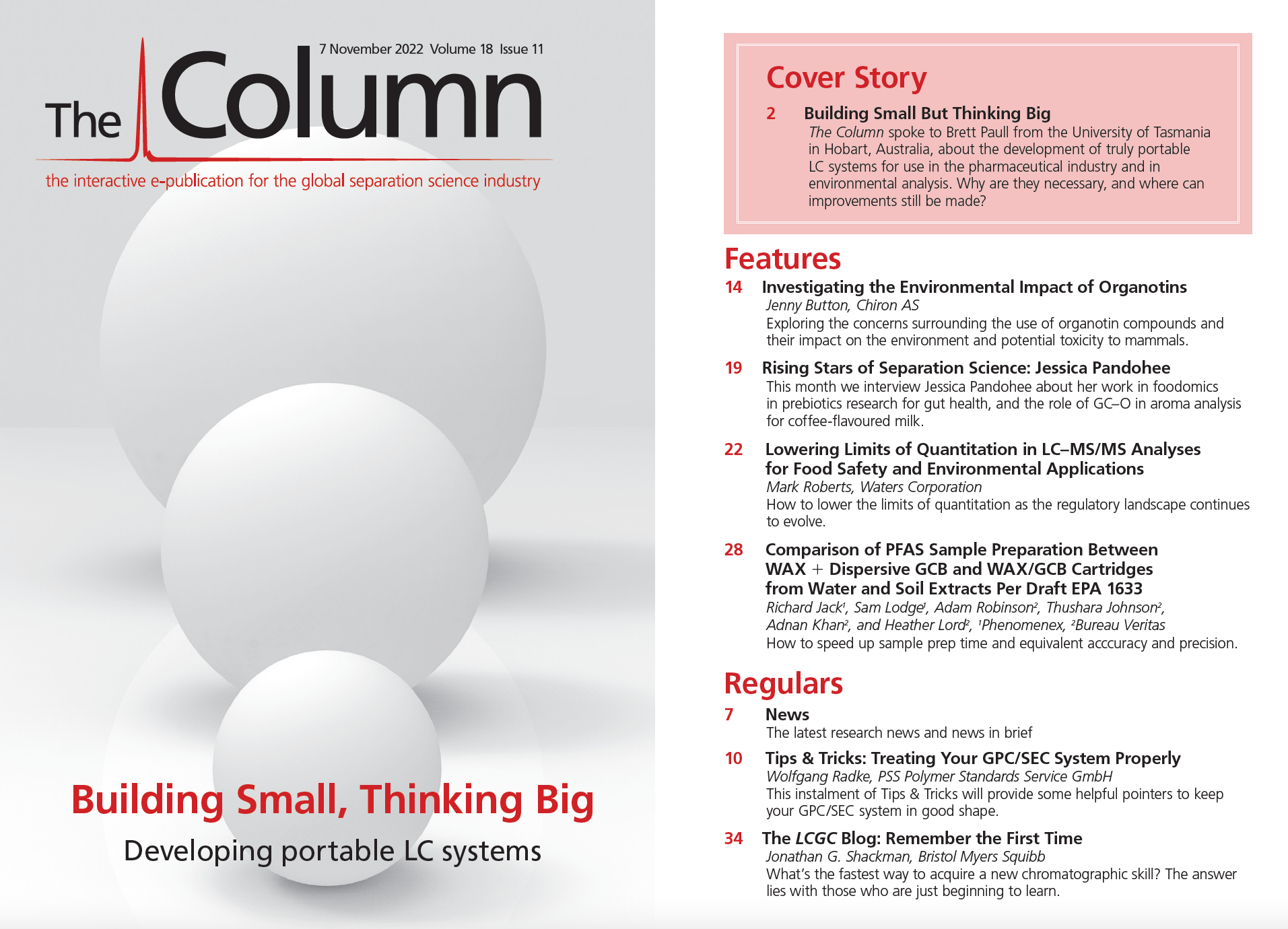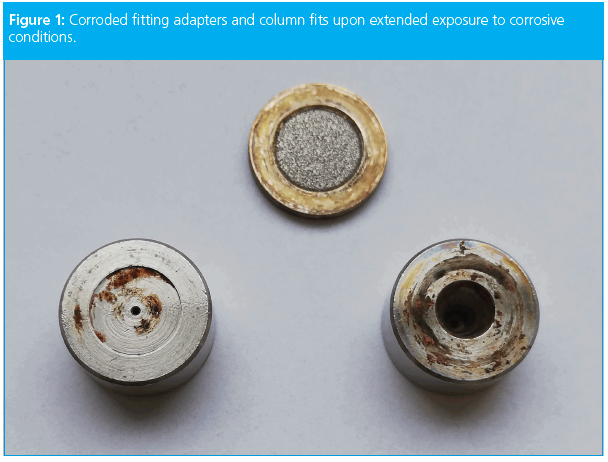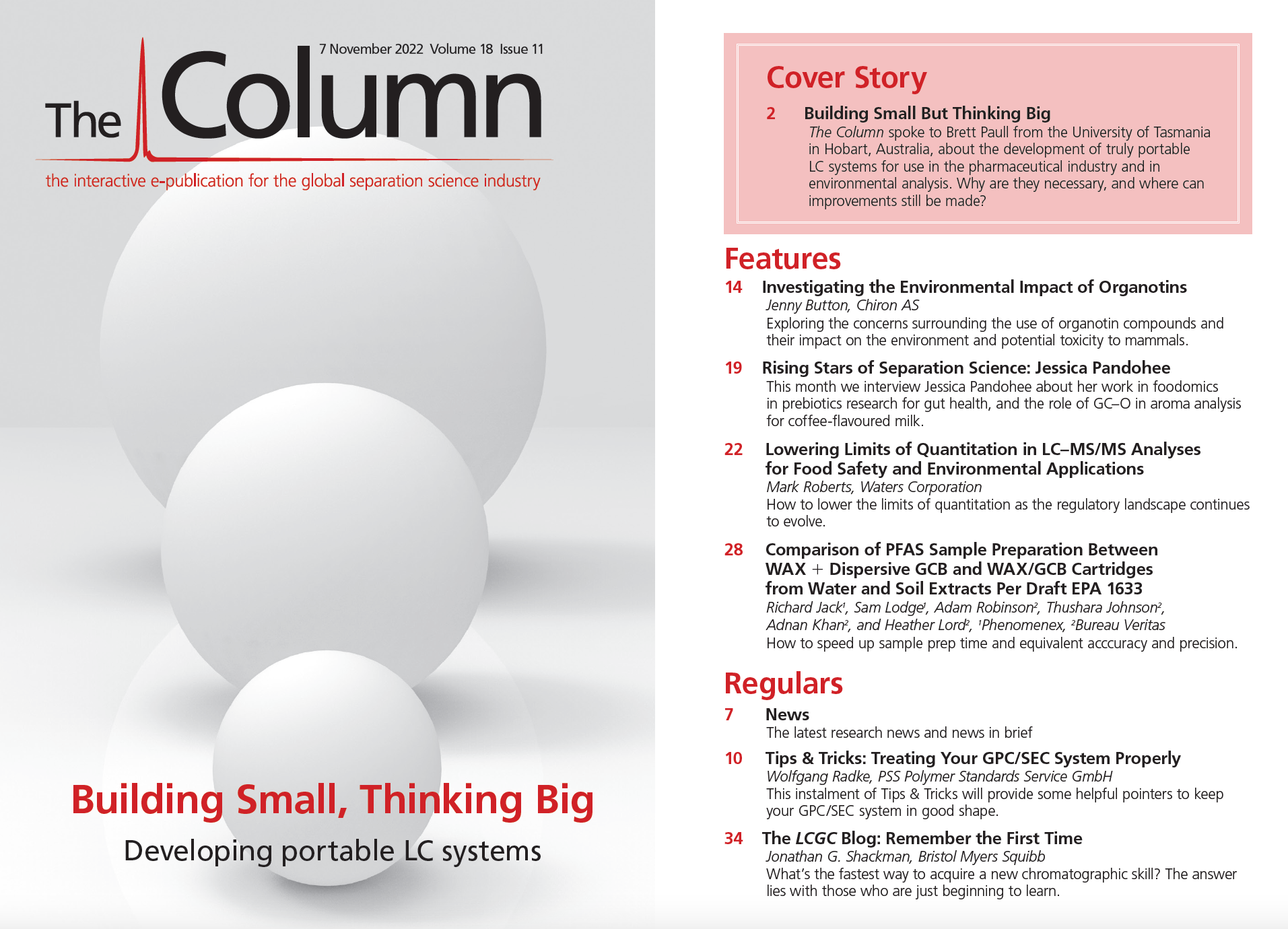The LCGC Blog: Remember the First Time - Chromatography
Do you remember your first time? Perhaps it was a tie-dye party. Maybe you experienced marker pigments dividing across a paper towel dipped in liquid. Was it a few spots crawling up a plate in organic chemistry class? Possibly it was pushing the plunger on a syringe and seeing what was once invisible turn into beautiful, Gaussian artistry walking across a chart recorder or computer monitor. Whenever it was, if you’re reading this journal, then you’ve most likely applied chromatography and remember the first separation that sparked your love for the field. That magical moment you felt was more than a waxing poetic memory. In fact, it was probably the time you were most apt to learn chromatography…or… apt to learn anything!
Be a Beginner
I recently read a wonderful book called Beginners: The Joy and Transformative Power of Lifelong Learning by Tom Vanderbilt (2021 Penguin Random House). At face value, it has absolutely nothing to do with chromatography. The author went on what some may view as a self-indulgent experiment to learn a variety of new skills as a middle‑aged adult. How in the world can a book about some journalist trying to learn to surf, play chess, juggle, and a few other adventures have anything to do with becoming a better separation scientist? Interestingly, throughout his journey, the author made frequent stops with top researchers in the field of learning to understand what was changing within himself as each skill was attempted. What was most fascinating was that regardless of the task, the pattern was similar and borne out by the science. We learn best when we approach something new. What’s more, if we can revert to a childlike innocence, our ability to gain competency (not to be confused with mastery) is rapidly accelerated. Our steepest learning curves come when we deviate from skills we dismiss as already acquired. For example, learning to sing to a level for public performance or drawing beyond doodles are so hampered by already-ingrained mindsets that progressing those skills is more difficult than learning something entirely new. Consider how much harder it is to learn a second language in adulthood, when your brain has already been taught how to converse, versus as a child that has never had to diagram an English sentence.
Learn to Fall
Along his journey, Vanderbilt visits the Infant Action Center at New York University’s Center for Neural Science. When learning about learning, it makes sense to watch babies as they grasp the basics. As any parent knows, infants figuring out how to walk tend to fall. A lot. For months. In fact, those that fall more frequently tend to ultimately conquer walking faster than those that shy away from testing gravity. They also get upright mobility quicker by trying lots of variations—random walking if you will—many of which attempts don’t work. It’s the process, however, that leads to ultimate success. Babies are lucky in that they have inherent advantages to take these falls, with built-in cushioning and flexible bones. Adults are more rigid—both physically and mentally. As we age, we tend to become more defensive and protective of our bodies. We know we’re more breakable as a lifetime of experiential cuts and bruises (possibly trips to the hospital) will attest to. We also more carefully protect our perceived view of ourselves. “I can’t run this new supercritical fluid chromatography (SFC) instrument because it’s different software, there are settings I don’t understand, and I’ll look dumb to my co-workers.” Yet this example, assuming you are versed in another area of separations, is a perfect opportunity, as it’s likely within the zone of proximal development. This is an optimal learning space between what you can do unaided and what you can do with a little help. It may feel like the edge of impossible at first, but it’s closer than you realize.
Variable Learning for the Win
Ideally, we would all have the time, money, and support to take in-depth courses with personalized coaching on whatever skill we wished to advance. In the real world, there are likely some low-resource opportunities in our everyday lives to advance our separation skills. When trying to elevate something that has become routine, the key to advancement is in variable learning. A runner that takes the same path at the same pace will quickly plateau in their training. If they add some sprint intervals or hill climbs or anything new, they’ll achieve more progress. A chromatographer that runs the same gradient on that 5 μm C18 column every day could also benefit from changing things up. If your environment frowns on these kinds of deviations, other avenues exist. If you’re a gas chromatography (GC)-minded scientist, take a chance and read that article a few pages over on liquid chromatography (LC) (and vice versa for the liquid phase folks). Curious about what’s going on in that mass spectrometer at your column outlet? Hop on www.chromacademy.com and wander through the available content (there’s tons for free). Lucky enough to be at a conference (hopefully we’ll see many of you at Pittcon 2023 for the ACS SCSC annual meeting!)? Try attending a session outside your comfort zone. Alternatively, take a lunch break and watch a webinar outside your daily sphere, such as at www.ACS.org/content/acs/en/ acs-webinars.html. A pharmaceutical scientist may find the latest advances in forensic technology as a breakthrough innovation in their own field. The key is to not be a robot running the same routine. Tangents aren’t just for peak integrations.
Indulge Yourself
A key lesson from the book is that it didn’t really matter what the specific new skill was. Learning one new talent helped subsequent attempts at other new competencies. Scientifically, you can read about neuroplasticity in the book. I prefer to think of it as becoming more comfortable with falling and regaining my childlike mindset. Take a stroll through your local library’s shelves and pick up a 101 book on whatever stokes your passion, whether it be coding or cooking. Download a new language course and listen on the commute to work. Sign up for that community class on plumbing, which will also be directly applicable to LC and GC! Go ahead— indulge yourself in that new skill, whether it be juggling, forging, or multidimensional separations. Learn to learn again!
This blog is a collaboration between LCGC and the American Chemical Society Analytical Division Subdivision on Chromatography and Separations Chemistry (ACS AD SCSC).
Jonathan Shackman is Associate Scientific Director in the Chemical Process Development Department at Bristol Myers Squibb (BMS) and is based in New Jersey, USA. He earned his two B.S. degrees at the University of Arizona and his Ph.D. in chemistry from the University of Michigan under the direction of Robert T. Kennedy.

Altering Capillary Gas Chromatography Systems Using Silicon Pneumatic Microvalves
May 5th 2025Many multi-column gas chromatography systems use two-position multi-port switching valves, which can suffer from delays in valve switching. Shimadzu researchers aimed to create a new sampling and switching module for these systems.
Characterizing Polyamides Using Reversed-Phase Liquid Chromatography
May 5th 2025Polyamides can be difficult to characterize, despite their use in various aspects of everyday life. Vrije Universiteit Amsterdam researchers hoped to address this using a reversed-phase liquid chromatography (RPLC)-based approach.
New Method Explored for the Detection of CECs in Crops Irrigated with Contaminated Water
April 30th 2025This new study presents a validated QuEChERS–LC-MS/MS method for detecting eight persistent, mobile, and toxic substances in escarole, tomatoes, and tomato leaves irrigated with contaminated water.
University of Tasmania Researchers Explore Haloacetic Acid Determiniation in Water with capLC–MS
April 29th 2025Haloacetic acid detection has become important when analyzing drinking and swimming pool water. University of Tasmania researchers have begun applying capillary liquid chromatography as a means of detecting these substances.

.png&w=3840&q=75)

.png&w=3840&q=75)



.png&w=3840&q=75)



.png&w=3840&q=75)
















